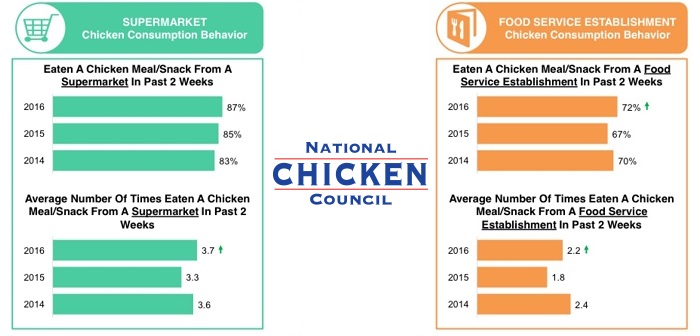A new poultry meat survey in the US has revealed that 92% of consumers eat chicken regularly with no sign of their habit changing any time in the near future.
The survey, commissioned by the National Chicken Council (NCC) found that chicken consumption levels are higher now than in either 2014 or 2015 with sales through supermarkets on a par with last year while food service-based sales are running 7.5% above 2015 levels.
“People are buying more chicken than last year and plan to buy more next year,” said NCC senior vice president of communications, Tom Super, adding that chicken tops the list of protein being consumed most often per week.
“While retail sales continue to be strong, the survey shows that more people are eating chicken away from home, which is good news for chicken producers, food service establishments and the overall economy.”
Carried out in early June, the survey involved 1,017 adults, 87% of whom ate a chicken meal or snack purchased from a supermarket in the two weeks before they were surveyed. The survey, part-funded by Elanco, also revealed that 72% of those questioned ate a chicken meal or snack from a food service establishment within the same two-week period.
“Consumers’ taste for chicken also shows no signs of waning,” said Mr Super. “In the next 12 months, 21% of consumers anticipate eating more chicken from supermarkets and 14% anticipate eating more from food service establishments. In fact, according to US Department of Agriculture estimates, Americans will eat 92 pounds of chicken per person this year, which will be a record amount.”
As part of the survey, consumers were asked to rank various factors according to satisfaction. This resulted in top ranking figures for freshness, taste and price.
When asked what claims (or issues) would either increase, decrease or have no impact on their likelihood to purchase chicken products, consumers said they were interested most in knowing that no antibiotics had been used in the production process.
In addition, when prompted, 71% of consumers said they were extremely or very concerned about food safety, while 57% mentioned hormone and steroid use, even though they are banned by federal law. Only 19% of respondents said they were extremely or very concerned about the time it takes to raise a chicken.


